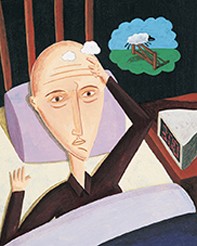Peer Reviewed
Feature Article Respiratory medicine
Insomnia: diagnosis and management
Abstract
Difficulties with sleep onset, sleep maintenance or early waking can be distressing and have a negative impact on quality of life.
Key Points
- Insomnia can have a negative impact on quality of life, decreasing mood, increasing absenteeism and reducing economic productivity. However, objective performance is not necessarily impaired.
- Insomnia is often a trigger for the onset of depression. It has been estimated that 40 to 50% of individuals with insomnia also experience a mental disorder such as depression. There is also a considerable overlap between generalised anxiety disorder and insomnia.
- Increased sleepiness is not usual in primary insomnia and should be explored in patients presenting with insomnia. Causes of increased sleepiness include sleep disorders (such as obstructive sleep apnoea and restless legs syndrome), medical and psychiatric conditions (particularly depression) and substance abuse.
- Cognitive behavioural therapy (CBT) is the most efficacious treatment of insomnia, improving total sleep time and general sleep quality and reducing sleep latency times and waking after sleep onset. More importantly, it shifts cognitions about sleep into a more positive framework.
- Pharmacotherapy may be used for short term management of insomnia, although it is probably not the best first line option. Benzodiazepines and nonbenzodiazepine GABA receptor agonists are the most commonly used drugs.
Purchase the PDF version of this article
Already a subscriber? Login here.

